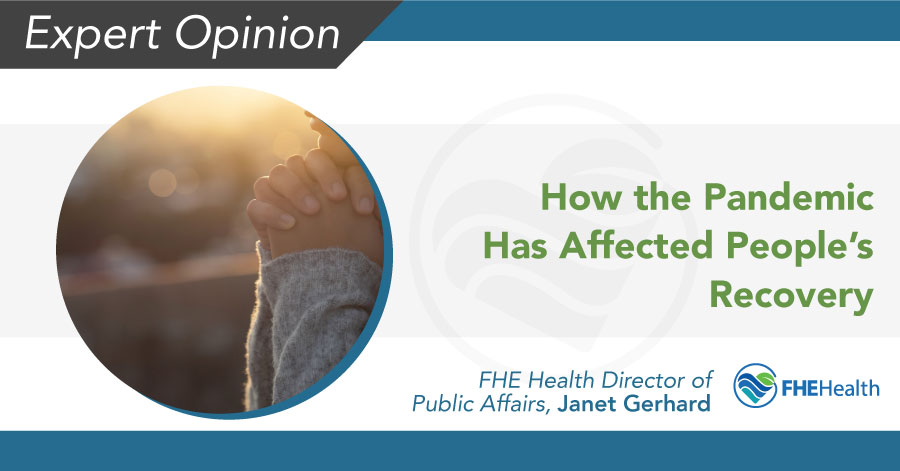
This article has been reviewed for accuracy by our peer review team which includes clinicians and medical professionals. Learn more about our peer review process.
Not everyone with a drug or alcohol addiction did poorly during the pandemic. Some people in recovery fared better. That is the conclusion of psychiatrist Anna Lembke author of Dopamine Nation, in an interview with NPR’s Terry Gross in August 2021.
When asked how the pandemic had affected various addictions, Lembke acknowledged it had been “terrible” for many people but emphasized she “also had a lot of patients who have done better during quarantine.” Why? Because the pandemic eliminated certain addiction triggers.
Here is Lembke describing the experience of her patients who found relief in the pandemic from certain drug triggers:
…What they tell me is that the world is kind of a hyper-stimulated, triggering place for them. Quarantine forced them to slow down and also eliminated a lot of the types of interactions and stimuli that would typically trigger relapse or reuse for them.
For more insights into this phenomenon and further perspective, we turned to FHE Health Director of Public Affairs Janet B. Gerhard. Gerhard serves as a treatment resource to union members and their loved ones and has seen firsthand how the pandemic has impacted people’s mental health and substance use. The conversation with Gerhard began with a discussion of Lembke’s observations and to what extent Gerhard found that the pandemic had helped people’s recovery, by removing certain drug and alcohol triggers….
How Did the Pandemic Remove Some Triggers for Addiction?
Social distancing and quarantining did remove some social triggers for addiction, Gerhard said. (By that she was referring to many of the pre-COVID social occasions where alcohol used to be on hand: parties, work happy hours, holiday celebrations, sporting events, etc.) The pandemic did not just eliminate these pressures and temptations—it also meant an end to the emotional triggers that often go along with them, according to Gerhard.
Emotional Triggers in Recovery That COVID Removed
“There are social pressures that we have to plan for,” Gerhard said. When many of these social gatherings like happy hours and parties were no longer an option, that meant a let-up in the emotional stress that so often can arise for people in recovery in social situations where alcohol is on hand.
For example, “people have to press pause before they say yes to a social situation with alcohol.” That itself can be an emotional strain, so “when they do not have to see others actively using or be in that environment, that is a form of emotional relief.” On the other hand, “the stress of seeing people every day or the pressure to join friends or colleagues at the bar can be a contributing factor in using.”
As a further illustration of the emotional triggers that are hard to face in alcohol recovery: “I heard someone say once that alcohol is the only drug that you have to make an excuse to your colleagues and friends regarding why you’re not using it,” Gerhard said. She gave the example of having gone to a party where people were asking her why she was not drinking. Someone asked if she was pregnant. “No, I’ve got a busy day tomorrow,” she had replied.
How Bigger Pandemic Trend Was People Drinking More
The absence of these emotional triggers may have helped some people’s recovery, but for Gerhard, these outcomes seem more like exceptions to an overall trend of people drinking and using drugs more. Gerhard would routinely hear people say their stress levels were higher and, eventually, they would divulge that they were also drinking more.
The pandemic also amplified many people’s sense of social isolation and loneliness, which in turn contributed to higher rates of substance abuse: “My experience has largely been that people drink more when they’re home and nobody sees what they’re drinking,” Gerhard said. She saw a drastic rise in admissions for alcohol treatment among the people who consulted her. In fact, she could not think of one conversation with someone in recovery who shared they had done better during the pandemic.
Positive Lessons in Self-Care and Stress Management from the Pandemic
Still, Gerhard was quick to highlight some of the positive lessons to be gleaned for recovery from living through the pandemic, “whether you’ve done well in your recovery or stumbled.” These lessons center around the importance of self-care and stress management—particularly, “how to manage stress and anxiety returning to work and how to build a plan for … your new normal, which is self-care and putting yourself before your work, spending time with family, and not absorbing pre-pandemic pressures.”
Another related lesson: “Treat mental health like it’s physical health. If you broke your arm, it would be on Facebook. A mental health condition is still shame-based, so how do we promote the conversation that mental health is as important?”
Finally, “The American worker is in charge, not the employer,” Gerhard added. “You’re in charge of your time, so enjoy your family and the things you could’ve lost during the pandemic.”
Has the stress of returning to work and other social pressures triggered more drinking and drug use? Reach out to FHE Health. Our counselors are available 24/7 to listen, answer questions, and offer treatment advice.






